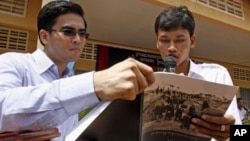The Documentation Center of Cambodia, a key research facility for the atrocity crimes of the Khmer Rouge, plans to start building a genocide institute that will be the first of its kind in Asia.
The Sleuk Rith Institute will offer graduate-level studies of genocide, conflict and human rights for Cambodians and foreign students alike, aiming to contribute to the prevention of genocide and the promotion of reconciliation for nations affected by atrocity crimes. It will include a school, a policy research center and a museum.
The school itself will not only focus on the Khmer Rouge, but such crimes worldwide, the school’s director, Dy Khamboly, told VOA Khmer.
“This is an advanced institute in Asia,” he said. “It will make a contribution to the prevention of genocide, reconciliation and remembering genocide because Cambodia has gone through a genocide during the Khmer Rouge regime.”
Sleuk Rith founder Youk Chhang, who is also head of the Documentation Center, says the institute will offer curriculum that will analyze the history of genocide and crimes against humanity.
“I’m committed to turning the legacy of the Khmer Rouge into the Sleuk Rith Institute, to achieve international status as one of the leading global human rights and genocide education institutes of the 21st century,” he said.
The institute will allow students and scholars to meet with victims of the regime and to visit crimes sites during their studies.
Dy Khamboly says that the institute will not focus solely on the Khmer Rouge.
“We’ll use the history of the Khmer Rouge as the main foundation,” he said. “The program will offer a comparison of genocides in other countries. We’ll study disputes, dispute resolution, peace and national reconciliation. We would like our studies to be a part of the genocide prevention campaign, not only in Cambodia but also around the world.”
The school’s programs will be taught by staff at the Documentation Center, who have already obtained bachelor’s and masters’ degrees in teaching. In addition, because of its cooperation with 67 universities and colleges in the US, Europe and Asia, the school plans to invite professors and experts on genocide to help teach, as well.
The institute will also include the Museum of Memory, led by Sirik Savina, who has worked at the Documentation Center since 2004 and recently led its Living Documents project, in which she brought villagers to witness the UN-backed Khmer Rouge tribunal and conducted film screenings in villages across the country.
The institute will also have a policy research center focused on national issues. The research center will be led by Eng Kok Thay, whose family was forced by the Khmer Rouge to flee the town of Siem Reap and who has researched the regime extensively.
Approved by the government in July, the institute will take three years to build, but a three-month program will begin next year, via the Documentation Center.







